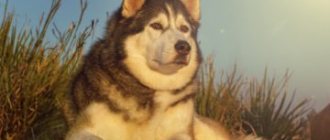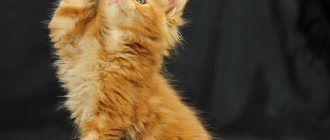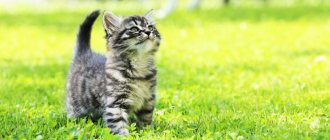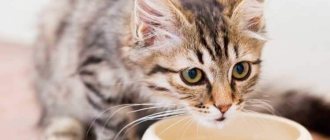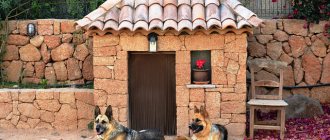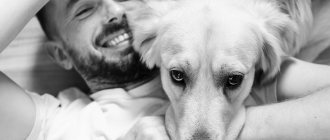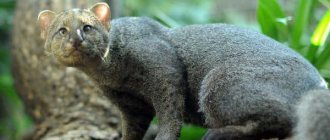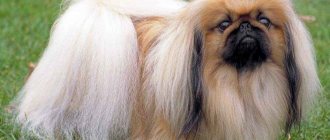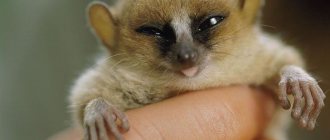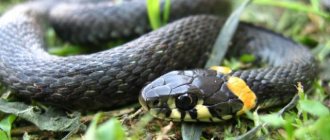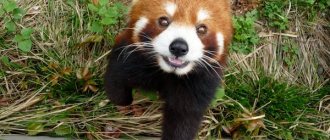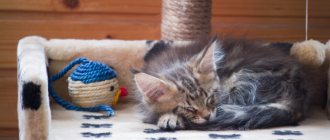In the photo there is a cat Pulcheria from the Yotunhem cattery (www.maine-coon.me)
There is an opinion that the life expectancy of Maine Coons is less than that of ordinary cats without a pedigree. Supporters of this point of view argue that maintaining the purity of the breed has a downside - the genotype is not updated, hereditary diseases are transmitted to an increasing number of animals, and as a result, the health status of a representative of a particular breed leaves much to be desired. The question of how long Maine Coons live is of concern to every fan of the breed who is thinking about purchasing a kitten. Most often, concerns about the life expectancy of Maine Coons arise among amateurs who visit breed forums on the Internet. On these pages, breeders share their experiences, talk about pet health problems, accidents, and unsuccessful births. A person just taking a closer look at the breed may get the impression that many Maine Coons are susceptible to diseases from childhood and, therefore, do not live long.
Lifespan
Among domestic cat lovers, there is an opinion that purebred pets live much less than their “simple” counterparts. This statement is wrong. With proper care, the life expectancy of a Maine Coon is 5-7 years longer than that of a non-pedigreed cat. However, there is an interesting nuance - cats and female cats of a given breed are given different amounts of time.
Cats
From the point of view of procreation, the life of any female individual is more important than the male one. After all, females are entrusted with an important mission - they must bear, give birth and raise offspring. It takes a lot of effort, energy and time to perform the reproductive function. Therefore, Maine Coon cats are more resilient and have strong immunity compared to males.
The lifespan of a pet is 16-20 years. This is decent enough for a pet. Cats cannot boast of such longevity.
Kotov
Maine Coon cats live on average 13-17 years. This is somewhat smaller than females. However, with proper care and regular monitoring by a veterinarian, a cat can live 4-5 years longer.
History knows a cat named Velvet from the USA, who lived to be 27 years old. The owner of the centenarian said in an interview that he walked a lot and communicated with the pet, and also allowed him to act in accordance with his natural instincts.
Spayed and neutered individuals
Spayed and neutered cats live 5-6 years longer than pets who remain sexually active. Experienced breeders explain this by the lack of stress associated with issues of reproduction and caring for offspring.
At the same time, owners of castrated and sterilized animals need to remember that they are prone to gaining excess weight and developing malignant neoplasms. Therefore, the health of such pets needs to be constantly monitored.
What is their character?
Representatives of this breed rarely show it. These are reserved natures who know their worth. They don't turn up their noses, they just behave with dignity. Behind the stern look hides a kind soul. Large creatures have funny habits and are not prone to whims. They have the following features:
- peacefulness and goodwill,
- tact and delicacy,
- independence,
- playfulness and curiosity,
- calmness, quiet voice,
- purring resembles a beautiful melody,
- They never beg for food or steal it from the table, silently waiting for food.
Kittens are ready to frolic without ceasing, and adults do this in the mornings and evenings. During the daytime they prefer to rest. Females behave like true ladies. They show more tenderness and willfulness - either they allow the owner to caress them, or they stop his attempts to stroke or scratch behind the ear.
Common causes of premature death
The following conditions contribute to the premature death of Maine Coon cats:
- Falling from height. Representatives of this breed, unlike other cats, are unstable on narrow surfaces and also have difficulty landing. Maine Coons often die from fractures after bad falls.
- Eating inedible objects. Maine Coons love to taste everything they come across. Sometimes this leads to death from asphyxia or poisoning. For example, when eating bags of household chemicals or small objects that get stuck in the throat.
- Inadequate nutrition. Not all owners feed their pets with high-quality food, not to mention specially prepared natural food. Many give cats their own food, and also “pamper” them with sweets, baked goods, fast food and other forbidden dishes. This diet can halve the life expectancy of Maine Coons.
In addition to the listed external factors that can “kill” a pet, there are also internal ones. Cats of this breed are characterized by diseases such as hip dysplasia, renal failure, and hypertrophic cardiomyopathy. In the absence of timely treatment, these diseases lead to the premature death of the animal.
Coat and color
Maine Coons are long-haired cats.
They have thick, shiny and silky fur. Guard hairs on different parts of the body have different lengths. The short ones cover the area of the head, shoulder blades and limbs, the longer ones grow closer to the tail. The belly, sides, “pants” and “collar” are quite fluffy.
The undercoat is well developed. It is soft to the touch, quite dense and waterproof.
Color – natural, varied. The most common wild colors are black and red marble, black tiger. In Russia, Maine Coons are often white and have various shades of agouti.
Artificial colors (lilac, chocolate, colorpoint, sorel, fawn) are not recognized by most felinological organizations, since they may be the result of interbreeding.
A characteristic feature of cats of this breed is thick and long hair! Short guard hairs grow only on the head and paws of the animal.
If a short-haired or smooth-haired individual is offered under the guise of a Maine Coon, it is likely that it is not a purebred.
How to extend lifespan
Every caring Maine Coon owner wonders what to do to make the cat live as long as possible. To do this, it is necessary to provide the animal with proper care. There are several basic factors that a breeder must take care of.
Nutrition
An inadequate diet and consumption of harmful foods leads to the progression of existing diseases in Maine Coons and the emergence of new ones. Veterinarians recommend choosing the following products for feeding large breed cats:
- lean meat: turkey, beef, chicken, rabbit;
- sea fish;
- fermented milk products: kefir, yogurt, natural yogurt, sour cream;
- quail and chicken eggs - no more than once every 6-7 days;
- fresh, boiled, baked vegetables: broccoli, pumpkin, carrots, cauliflower, zucchini;
- fresh chopped fruits - apples, pears, black currants;
- cereals
You should not overfeed your pet and allow it to become obese. Maine Coons often suffer from hip dysplasia, and excess weight can significantly aggravate the disease.
From industrial feeds, it is recommended to use holistic feeds, as well as premium and super-premium mixtures.
For a complete list of what you can feed your Maine Coon, see the article: “Maine Coon Diet.”
Conditions and care
As practice shows, Maine Coons kept in private homes live longer. The life expectancy of apartment dwellers is somewhat shorter - there the cat is deprived of the opportunity to exercise, breathe fresh air, or “pinch” fresh grass rich in vitamins.
Proper care also affects the lifespan of Maine Coons. The cat should always be kept clean - remove dirt from the nose, wash the eyes and ears, trim the claws. Particular attention must be paid to wool hygiene - you can bathe your pet once every 2-3 weeks, but you need to brush your Maine Coon every day.
It is also necessary to periodically inspect the animal's fur for fleas. To avoid such troubles, it is better to immediately buy a special collar for the cat.
Physical activity
The Maine Coon is a born hunter. Nature inherent in it is the desire to track and catch prey, constant movement. Do not suppress the natural instincts of your pet. After all, a measured, recumbent lifestyle can lead to obesity in a cat.
To maintain physical activity, you need to constantly play with your Maine Coon and walk it at least 2 hours a day. Experienced breeders recommend owners of large cats buy special play complexes for their pets, including houses, scratching posts, multi-level platforms, and vertical posts. Daily exercise will improve your cat's health.
Maine Coons are highly trainable. Therefore, you can choose a simple set of exercises that will not let your pet get bored. Cats of this breed easily follow the commands “sit”, “give paw”, and bring an abandoned toy to the owner.
Sterilization or castration
Castrated and sterilized animals live an order of magnitude longer than pets that have not undergone the corresponding operations. Therefore, if the Maine Coon owner does not plan to breed professionally, veterinarians recommend castration or sterilization. These medical procedures are absolutely harmless to animals.
As a result, the pet will receive inner peace and will not experience seasonal stress. It will also save the energy needed to find a partner. Neutered cats are healthier due to the absence of pregnancies, childbirths, and the absence of nursing kittens.
Spayed and neutered Maine Coons are prone to obesity. Therefore, after the operation, it is recommended to transfer them to specialized industrial feed.
Treatment and prevention
Maine Coons have some health characteristics. This breed of cats is characterized by frequent diseases of the cardiovascular, excretory systems, and musculoskeletal system. Therefore, owners of furry pets need to remember the basic preventive measures aimed at maintaining health:
- The cat should be constantly shown to the veterinarian, at least once every six months. It is also necessary to visit a specialist if your pet behaves strangely: refuses to eat, sleeps a lot, or shows restlessness.
- Starting from 2.5 months, the kitten must be vaccinated against rabies and other diseases (chlamydia, tracheitis, pylencopenia). 7-10 days before vaccination, the animal must be treated for worms, fleas and ticks.
- When feeding a cat natural food, it is recommended, together with a veterinarian, to select the appropriate vitamin and mineral complex (depending on age, gender, nutrition, conditions of detention).
- To maintain healthy teeth and oral cavity, you should introduce solid food into your pet’s diet and buy special sticks for cleaning teeth. Your cat's mouth should be examined by a veterinarian once every six months.
Interesting: “How to choose a Maine Coon kitten.”
How long Maine Coons live is a controversial question. Much depends on the owners. To prolong the life of a pet, you will need to provide it with good care. And the main thing is to show the cat your love and affection. Sometimes this is a decisive factor in increasing the life expectancy of the Maine Coon.
Video: interesting facts about the Maine Coon.
Care Tips
Experienced breeders advise creating the following conditions for keeping a Maine Coon:
- Prepare a place for food. Place a large, stable container for water separately; coons love to wet their paws. Two separate bowls for dry food and wet food - for ready-made food or homemade food.
- To care for the Maine Coon, two litter trays with granular filler are installed, which are selected individually to suit the pet.
- You will need a secluded corner with a house where the coon will rest and sleep.
- They install several scratching posts so that those who like to sharpen their claws will be less likely to strip furniture and wallpaper.
Grooming
Maines are famous not only for the large size of their long, powerful body, but also for their coat. This breed has a luxurious coat with semi-long pile, a large woolen collar around the neck and everything ends in a magnificent fluffy tail that can cover the entire body. Caring for Maine Coons to keep their coat shiny and silky requires care and careful grooming.
For proper care, you will need to purchase a set of accessories, which includes the following set of tools:
- to penetrate deeper into the fur, use a comb with teeth of different lengths;
- a comb with wide teeth, good at breaking up hair that has bunched up in a ball;
- for combing out small “kaltushki”, removing dirt, a comb with frequent teeth;
- to remove dead, fallen hairs, use a fine-toothed comb;
- a small slicker brush with stiff bristles of natural origin;
- sharp scissors are useful for cutting out tangled pegs;
- It is useful to purchase a Furmitator, which simplifies combing wool.
When choosing tools, do not forget to pay attention that they are not made of metal and do not produce static electricity with sparks. At the same time, they give preference to combs with non-sharp, rounded ends, so as not to injure the pet’s skin.
It is better to start caring for Maine Coon fur with a thorough examination of the entire coat, especially in places where it often falls into “kaltushi”. They inspect the sides, under the hips and the collar one by one, spreading the fur with a comb, looking for tangled pieces, trying to break them or carefully cutting them out with sharp scissors.
When purchasing a Maine Coon kitten for a home, the owner must understand that it is not enough to just take care of the pet, this large, beautiful animal, similar to a wild lynx, is actually a good-natured animal, needs communication, craves attention.
Establishing the maine's trust will allow the cat to endure all unpleasant procedures and be devoted to the owner all his life.
Active lifestyle
Despite their enormous size, raising Maine Coons is possible. They are very active animals and will not spend time lying on the couch. They are constantly on the move, love active games, and are very sociable.
If you constantly work with them and educate them from an early age, you can achieve good results. Training a Maine Coon is quite possible. They learn some dog commands:
- respond to the call and always come running when you hear the nickname;
- can execute the “fetch” command and give a toy;
- master the “sit” command.
But when the mane is not busy with games and communication, he can act up, break a vase, drop an indoor flower from the windowsill and do a lot of mischief.
Accessories for Maine Coon
The peculiarities are that Maine Coons have retained their hunting instincts, they are constantly on the move, love to play, and cannot lie still for a long time. For them you need to immediately select a set of accessories. Otherwise, he will turn any thing he likes into a toy. The industry has developed a lot of useful things and toys for the cat fraternity, such as:
- Scratching posts of different shapes and types;
- Play complexes with several houses and multi-level playgrounds;
- Separate houses, hanging hammocks and soft beds;
- A variety of soft, winding toys, balls and intricate tunnels.
And finally
There can be no definitive answer to the question of how many years your Maine Coon will live and whether he will always be healthy. On average, Maines live 12-15 years, but in some individual cases the age limit can increase to eighteen years or more. Of course, the Manx breed has hereditary risk factors (like almost all animals), but this risk will be significantly lower if you purchase a kitten from trusted breeders. And with proper maintenance and your tireless care, your pet will delight you for many years to come.
Many examples of long-lived coons can be seen on the forum of owners of these wonderful animals:
To keep the kun healthy
Special complexes help organize a sufficient level of activity for the coon
Problems with teeth and gums can be avoided by regular brushing using a soft brush and special cat paste. And don’t forget to check if the cat has plaque or tartar – if they appear, it is quite possible that the teeth will have to be cleaned with an ultrasound at the veterinarian.
It is very important that your Coon has the opportunity to move and play a lot - cats of this breed are hereditary hunters and cannot be just “sofa cushions”. For the Maine Coon, it is necessary to equip a corner with a platform and various “sports equipment”. Physical activity is the key to your pet’s health and long life.
Amazing Maine Coon
The Maine Coon Cat is considered the pride of North America, and for good reason. These cats are distinguished not only by their large size, long silky hair and tufted ears, but also by their intellectual abilities. Many researchers who study them claim that representatives of the breed are capable of performing deliberate and logical actions, characteristic of some dogs, for example, Labradors.
Maine Coons are ideal pets in every way. They:
- educated and peaceful;
- treat children well;
- amenable to training;
- clean;
- adapt to the owner's habits.
The only controversial point in buying Maine Coons may be the need for care. However, if you understand the issue well, you will notice that caring for these cats is not so difficult. How to care for a Maine Coon at home?
Kidney and urinary tract diseases
- Inflammatory diseases of the urinary ducts. They develop when infections enter from the outside or during the movement of kidney stones. Symptoms are similar to urolithiasis.
- Nephritis. It is characterized by rare urination, and the animal experiences discomfort and pain. Swelling and restless behavior appear. Often nephritis becomes a complication after a cold. In such a situation, the Maine Coon is kept warm and ensured peace. It is advisable to adjust the diet by contacting a veterinarian. If necessary, the specialist will prescribe additional treatment.
For what reasons does a cat baby not gain weight?
Maine Coons usually grow well and quickly, and by the age of 2 months their weight can reach 1.5 kg. But it also happens that the Maine Coon does not gain weight, which is not the norm. Reasons thought to contribute to poor weight and height gain include:
- Poor food for mother cat.
Lactating female Maine Coons are fed at least 3 times a day with special food for lactating cats or food prepared by a caring owner (lean meat, fresh dairy products, cereals, occasionally fish and boiled eggs, vegetables and vitamins prescribed by a specialist); - If the cat is still too small, he may simply weakly suck his mother's milk.
Or the cat’s milk itself is not enough. To keep babies fed, some owners feed them with cat milk substitutes; - Harmful (toxic) mother's milk.
Milk can be dangerous if the animal suffers from mastitis, metritis, or uterine abscess - problems that are common after childbirth. The milk of an animal that is treated with any medications without the consent of a veterinarian is not at all beneficial; - Lack of vitamins and anemia.
If there are few useful components in mother's milk, Maine Coon babies can easily grow poorly and slowly, and be weak; - Worms.
These parasites are often transmitted to kittens from the mother through milk. Naturally, worms do not leave a chance for weight gain; - Genetic deviation.
It happens that among five kittens one weighs very little and looks too weak. This happens with people too, when one of the twins is in full health, and the other is on the verge; - Disease.
In fact, any disease that was transmitted to the baby from a cat or developed independently can affect weight gain. When the kitten is clearly not feeling well (stool problems, vomiting, temperature (normally it should be 38.5-39.5 degrees), discharge from the nose and eyes, plaintive meowing, etc.), you should quickly run to the veterinarian or call a doctor on house; - Crossing a Maine Coon female with an outbred male.
Usually such cases are excluded, but sometimes they still occur. A half-breed cat may well gain weight more slowly than its purebred counterpart.
The Internet is full of advice on what drug can be administered to a small Maine Coon. Trusting recommendations from cat forums is not always wise. Many medications can do more harm than good. In addition, without a correct diagnosis, treatment cannot begin.
Tray training
If a kitten is purchased from a breeder, it means that it is already 2-3 months old, and therefore, it knows what a litter box is.
In this case, the baby only needs to be shown a new place where the kitten should go to the toilet. If, for example, a kitten lives in a large house, it is better to have several such litter trays. Some Maine Coons have a characteristic habit of going to one litter box when needed, and to another when needed. If litter box training occurs on your own, you need to pay attention to the animal’s behavior. You can recognize that a kitten needs a toilet by its behavior:
- the animal begins to worry;
- looks for a secluded place;
- squeaks or meows.
If this happens, you most likely need to plant it in a tray. The owner must carefully move his pet. If the kitten does not understand what is required of him, the person should dig a little into the filler with his hand, thereby letting the cat understand what needs to be done here. If you were unable to do this in time and the kitten made a puddle, you need to wipe it off with napkins and put them in the tray. By the smell, the kitten will understand where he needs to go.
Tray training.
A haircut
Not many people know whether it’s possible to cut a Maine Coon’s hair or don’t understand why. Show class cats are intended not only for raising in the family, they are prepared for display at exhibitions. A Maine Coon haircut is required for particularly unique specimens. They must look great and occupy prestigious first and honorable places, they are photographed and proud of them. Coons with lion haircut look beautiful. Such animals require meticulous care and maintenance, visits to salons and care from groomers.
Grooming will also be useful for pet class main dogs, which are of no show value, but are dearly loved by their owners. Many people want to trim their Coon hair so that the pet is not only beautiful, but also well-groomed and comfortable. Haircut helps with this;
- In the summer, the shorn Maine tolerates the heat more easily and feels better.
- During the molting period, it is easier to comb out loose hair and get rid of tangles on a Maine Coon.
- The animal will have less licked hair in its stomach, which leads to vomiting and constipation.
Each owner has developed his own opinion about the beauty and appearance of the Maine Coon. The natural beauty of uncut raccoon cats, similar to a predatory lynx, is no less attractive.
Grooming Maine Coon
To prepare a coon for an exhibition, it is better to seek help from specialists at a grooming salon. An experienced hairdresser will not only select a haircut model, but will also tidy up the ears and claws.
Maine Coon grooming is often suggested to be done under anesthesia, but such a procedure is harmful for the feline. If your pet can easily tolerate hairdressing services, then it is better to carry out the haircut naturally.
Grooming specialists in the salon, at the request of the owner, perform the following services:
- On a special grooming table, equipped with holders, there are similar rings for dogs; they will reliably fix the Maine cat.
- After the inspection, the master will determine the scope of work, offer a haircut option or agree with the owner’s choice.
- Having finished the haircut, he will completely wash the coat with professional cosmetic shampoo and balm, dry it well and comb it.
- All that remains is to trim the claws and treat the eyes and ears.
A Maine Coon, after being groomed by a groom, looks natural, with shiny, fluffy fur and a gorgeous, well-combed tail. At the same time, the average cost of the service in Moscow will be from 2200 to 2800 rubles and depends on the condition of the coon’s coat, its weight, and the volume of services performed. A hairdresser visiting your home for a haircut in Moscow costs 200 rubles, outside the Moscow Ring Road – from 350 rubles.
